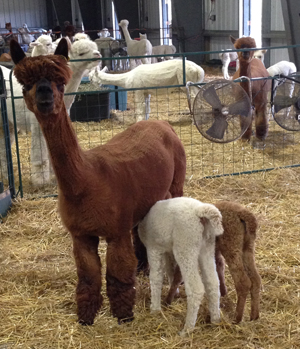Surrogate dams to the rescue (again).
Let’s face it, with a herd our size bad stuff just happens sometimes. This is particularly true where the question of our production females are concerned. With 70 to 80 expectant females each calendar year, the odds of us going through a full birthing season drama-free are pretty much nonexistent. Even with 17 years of experience in the rear view mirror of breeding and birthing these amazing critters, Mother Nature still likes to throw us a curve ball or two each year. Though the average age of our female breeding herd is significantly younger now than it was just 3 or 4 years ago, the direct result of our culling and meat business, that in and of itself has presented other challenges. With a higher percentage of younger, first time birthers, you just never really know sometimes how they will react to the concept of motherhood? While the old axiom that “good moms produce daughters that make good moms” is almost always true, there are unfortunately rare exceptions to that rule.
Maybe because I am a human who has had to have everything taught to him (not that you’d think I’d learned anything sometimes), it never ceases to amaze me just how often first-time alpaca dams and their new crias both instantly start bonding, with the baby nursing independently, often times within just an hour of being born. That instinct is a powerful thing. Though over the years we’ve certainly dealt with our fair share of nervous first-time moms who were at first standoffish, if not outright kicking their crias away, we’ve almost always managed to get those same dams to eventually accept and bond with their babies. Often that has entailed some serious but quiet intervention from us, whether holding the new mom while she gets used to the sensation of her cria nursing and/or supporting the strength of the neonate by offering it a bottle so that it can keep up its strength and continue pestering it’s somewhat recalcitrant dam until she gives in and lets it nurse. Most often in those cases the new moms do fully understand that the cria is theirs, they’re just not always so convinced about that whole cria-touching-my-udder thing at first.
Prior to this year, the only two recent cases of permanent maternal rejection that we had seen here had involved some very painful births. Included in that count was our farm’s second ever birth via C-section, a couple of years back. It involved a nasty uterine torsion and emergency surgery in the Arena’s break room. Though it all worked out in the end, it was definitely touch and go when it all went down. Regardless, in that particular case, by the time the dam in question was pain-free enough that she might have allowed her little girl to nurse, more than a week post-partum, her cria was already rather enjoying her hanging goat bottle that we had trained her to. Though Musette and her dam, Boheme, did indeed bond emotionally — they slept side by side most nights like most of our mother/cria pairs — Musette never nursed off of her mom independently even once in her life. Boheme, by the way, went on to birth and suckle another daughter in 2013 as though the previous year’s birth drama had never happened in the first place. In any case, the rule of thumb here is that in the rare case that a female does reject her cria at birth, she gets one more chance to prove that it was down to immaturity. We are in the business after all of promoting maternal lines that amongst other things are capable of taking care of their own young, so if you go rejecto on us a second time, the animal in question is removed from the breeding herd, regardless of whose daughter it is, how much it cost, or how many awards it may or may not have previously won.
So that’s all well and good right, but what about the rejected or orphaned crias that still need someone to feed them? Bottle babies are a pain in the ass, no denying that. What starts out as very cute (if the cria in question is cooperative and willing to play ball), no doubt loses its novelty very quickly after multiple late night and early morning trips to warm a bottle. While we have had fairly good luck training orphaned crias to a hanging goat bottle over the years (you can read and see some pics from the Boheme/Musette backstory here), the ideal situation is to find the orphan a surrogate mother. Fortunately we (read: Jennifer) have had a pretty good track record of grafting orphaned or rejected crias onto other females.

When a female recently gave birth and rejected her newborn — this unfortunately for her and for us was the 2nd year in a row that she had pulled that stunt — we spent a week+ bottle feeding the little dude, before we were able to convince another one of our females, Charming, soon after she gave birth to her own live and healthy cria, that she had in fact had “twins.” Well, sort of. Charming, who comes by her adoptive instincts honestly, being the daughter of CCNF Opal (more on her in a second), was never totally fooled that this other cria was really in fact hers, but she was receptive to the idea of nursing it along with her own little boy nonetheless. As it turned out, some days later when another female, Omnia, unfortunately lost her cria at birth, we were in fact able to bond Charming’s “twin” boy onto Omnia instead. As it turned out, what we’ve seen for the past 10 days or so since that latest successful cria grafting is that though Omnia is fully convinced that the little guy is truly hers, for his part, her new cria is quite happy to bop back and forth between his two adoptive moms, nursing off of either Omnia or Charming, depending upon his convenience. Not a bad gig in the end really for a little guy whose biological mother didn’t even recognize his existence! And as a note to the aforementioned exception to the rule about great moms producing great moms: the rejecting female in question came from one of the most potent and reliable maternal lines on our farm. Our female foundation herd is festooned with her aunts and cousins, so her decidedly unmaternal instincts came totally out of left field. Sh!t happens.
Another way in which we have been very fortunate in dealing with orphaned crias, is in having some dams that seem quite happy, completely of their own volition, to nurse multiple crias at once – no human intervention needed. The greatest practitioner of this behavior has been our beloved Opal, who we have quite literally witnessed in years passed nursing 4 crias simultaneously (can I have your baby too?). I guess she’s got four teats for a reason, right? This year as another female of ours, Golden Bliss, got sick and later died — of cancer apparently — it was to Opal, who already had a little girl of her own at side, to whom Bliss’s daughter, Amanda, naturally gravitated to to supplement her caloric needs. Nowadays Amanda and her adoptive sister, who are both over 3 months of age and growing like weeds, hang out with and nurse off of Opal as though it is the most natural thing in all of the world. Though Opal was a 2-time Futurity Champion and is amongst other things the dam of both the aforementioned Charming and our Champion Herdsire, Invictus, it’s hard not to see where her greatest contribution to CCNF has really been. Every cria that she has ever adopted or supplemented was one more that didn’t need supplementation from one of us! I will grant that having a larger herd with birthing and feed groups that number 14 females per group (plus their crias), lends itself to finding such solutions. I do remember way back in the late 90s Earlah Swift of Mariah Alpacas, one of our first mentors and the undisputed matriarch of the New England alpaca community at the time, telling us that she had females who played that same role in her herd, that of the benevolent wet nurse and den mother to all. It goes without saying that if you are fortunate enough to have a female with Opal’s adoptive instincts in your herd, take care of them: from a farm management and husbandry perspective alone, they are worth their weight in gold!
Follow me on Twitter @CCNFalpacas

I have a female who will nurse any cria that wants to nurse. I wouldn’t trade her for anything! Thanks for another great story